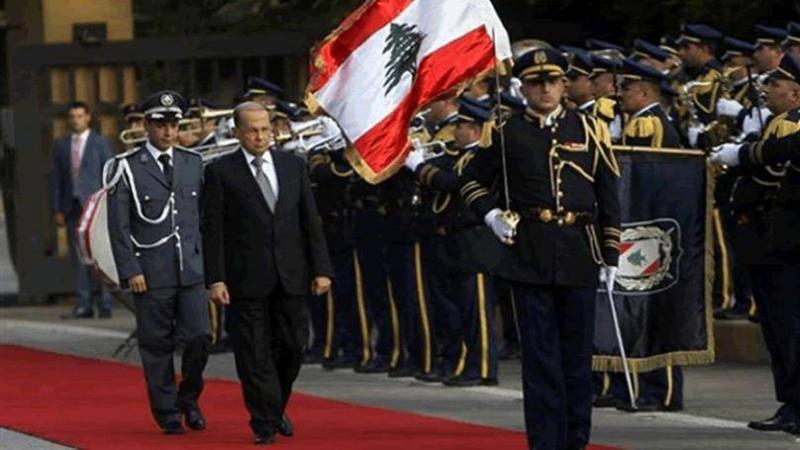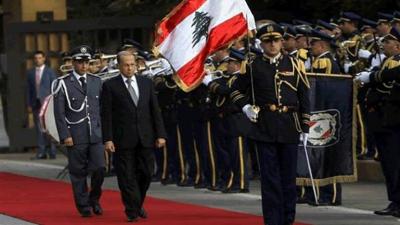President Najib Mikati, tasked with forming the new government, is fortifying himself with patience and resilience in the face of constitutional heresies aimed at deviating from the constitution by overthrowing the "Taif Agreement." Despite this, he refrains from directly engaging in a debate with President Michel Aoun, although he was recently compelled to respond to comments relayed from Aoun by Maronite League President Ambassador Khalil Karam. Mikati asserted that presidential powers do not transfer by proxy to a caretaker government in the event of failure to elect a successor, but rather to a fully formed government. Mikati's response through his media office was appropriate because it is unacceptable to use the presidential platform, which should be above sectarian considerations, to issue statements that inflame tensions. Karam should have refrained from implicating himself, as indicated by observers of the coup personally sponsored by "Free Patriotic Movement" leader Deputy Gebran Bassil against the constitution, culminating in the dismantling of the "Taif" Agreement, with complicity from the political faction loyal to the President, which leads in issuing "fatwas" contrary to the constitution that stipulates the transfer of presidential powers to the Council of Ministers if a successor has not been elected.
Karam's volunteering to relay what he heard from Aoun regarding the transfer of presidential powers was met with astonishment, not only because the constitution does not specify the characteristics of the government that will assume his powers in proxy but also because Aoun's objectionable stance, according to observers, could provoke sectarian reactions regarding the powers of the Prime Minister, potentially opening the door to sectarianism in the phase following the President's term expiration, especially if Parliament cannot elect a successor within the constitutional deadline.
Observers reveal that Bassil was behind the hasty scheduling of Karam's meeting with Aoun and personally contacted him the night before to inform him of the appointment. These individuals assert that Mikati's decision to remain patient and resilient does not extend to Bassil, who bets on escalating tensions in the country to create a vacancy in the presidential seat. This demands that Mikati's media office respond to the obstruction of the presidential election process, starting with sabotaging efforts to form a government, but not at any cost as Bassil stipulates.
They inquire why Karam attended Baabda alone to meet the President only to read a written statement immediately after the meeting without bringing along, as in previous instances, members of the Maronite League Council. They question whether the lengthy statement he released summarizes the less than fifteen minutes of the meeting, or whether it was prepared in advance to comply with Bassil's wishes.
These individuals emphasize that Aoun insists during times of crisis on not recognizing the "Taif Agreement," nor the constitution produced by the National Accord Document, perceiving it as the root of his exclusion from Baabda and his forced journey to the French embassy and then to Paris. They consider that the presidential team's threats to withdraw Mikati's mandate to form the government are one of Bassil's attempts to blackmail Mikati and pressure him to concede to his conditions for releasing the ministerial lineup.
Moreover, they add that Bassil's threats, under Aoun's cover, to withdraw Mikati's mandate is an old-new scenario; the presidential team had previously waved this when former Prime Minister Saad Hariri was tasked with forming a government but hit a deadlock, and his resignation from the endeavor was not a withdrawal of mandate but a result of Paris giving up its conditions for saving the country, which rendered it unable to promote its initiative, which was solely about forming a government at any cost, contrary to its set criteria that demanded a composition of specialists and non-partisans.
These observers believe that Aoun lacks the ability to withdraw the mandate from Mikati in response to the ambitions of his political heir Bassil, not only because he has clashed with most political forces except "Hezbollah," but because the Shiite duo is unwilling to provide political cover for him to withdraw Mikati's mandate and refuses to be Aoun's spearhead in a confrontation with the Sunni community, which could have dire consequences and lead to a resurgence of sectarian tensions. Additionally, Speaker of Parliament Nabih Berri stands ready to counter the presidential political team in light of the absence of political chemistry between him and Bassil and the need to coexist with Aoun.
Therefore, Aoun today is not the same as he was in 1989, which saw Arab divisions impacting the internal Lebanese situation, alongside varying attitudes within the international community, highlighted by Paris's support for him versus Washington's apprehensions about Aoun's role, forcing him to take refuge in France when Kuwait was liberated from then-Iraqi President Saddam Hussein, which restored Syria's role in Lebanon.
Consequently, the international community is keeping a close watch on Aoun and his political team, even if electing a president becomes impossible and the decision is made to postpone the election to a later date. Western sources assert that they will not allow him to remain in Baabda or exploit the presidential vacuum to deviate from constitutional frameworks, bringing the country back to square one. At the same time, messages have been sent to Aoun and his team warning against complicating the election of a new president.
Furthermore, observers suggest that Mikati's endurance against intimidation campaigns does not imply that the path is clear for Aoun and his team to overturn the "Taif Agreement," which Mikati regards as a red line that must not be crossed.




